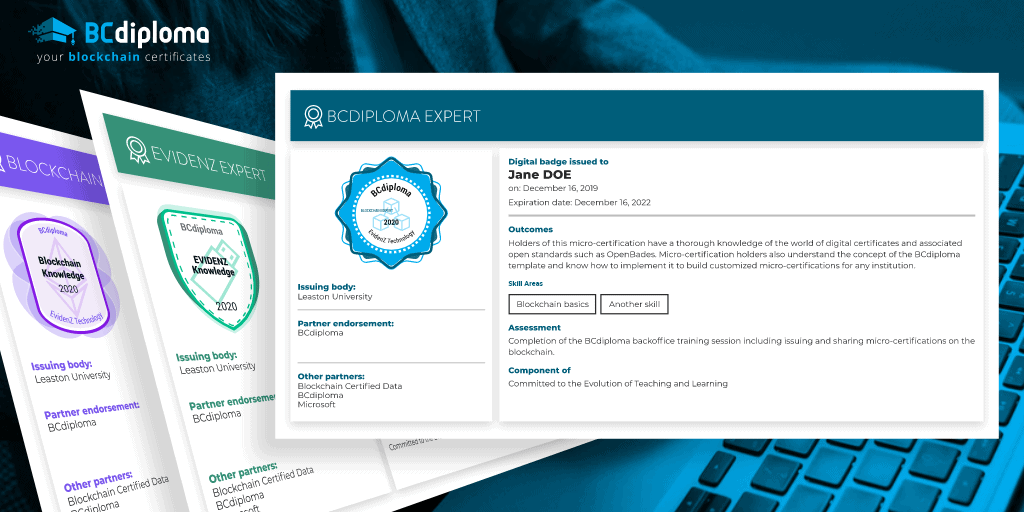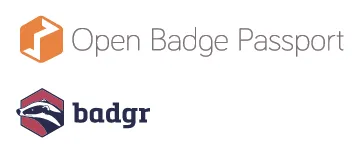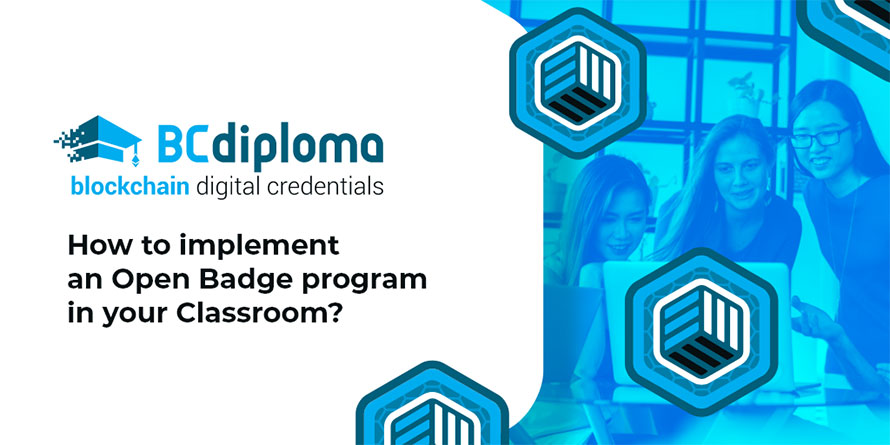Do you wish to set up an Open Badge system for your classroom or training group?
An Open Badge is a digital credential in the form of an image file, which is used to certify a specific skill, learning, expertise or achievement. It is typically issued by a university, a recognized institution or a certified trainer to validate informal skills or attest to the completion of a training course.
Open Badges are growing in popularity in a context of fast-expanding online training platforms and universities (e.g. Microsoft, Amazon, Scrum or Agile certifications, etc.).
Whether you are a teacher or a certified professional, be it in a class, university or professional training setting, Open Badge systems are likely to be the most relevant, widely used and recognized solution for your course.
In the case of a university class, Open Badge is not only useful to recognize online and remote learning, but also to provide a degree format that is 100% forgery-proof and secure. BCdiploma takes a closer look at how an Open Badge program can be implemented for your specific course.
Why implement an Open Digital Badge system for your class?
The Open Badge is not intended to replace traditional diplomas. Quite the contrary in fact, as it aims to supplement and enrich it through targeted skills validation.
Participation in training workshops, seminars or conferences rarely results in physical diplomas. As a training provider, implementing an Open Badge system will extend your learners’ skills recognition on a larger scale.

In fact, 90% of informal skills that are invisible on a traditional CV can be highlighted by micro-credentials with the Open Badge system. By attesting to a specific language skill or software proficiency for instance, your learners can raise their profile and gain confidence for the rest of their training.
An Open Badge system to secure traditional diplomas
An Open Badge system can be implemented retroactively to ensure the security and authenticity of a traditional paper diploma. Just like emlyon business school, your university can grant Open Badge diploma to all their graduates and alumni.
A dematerialized diploma can safely hold its certifying information, and be transferred to any online platform or website. It is a guarantee of confidence for graduates and alumni, who benefit from continuous and instant access to their certifications in digital form.
By implementing a system of micro-credentials and Open Badges, you enhance the value of your training offer, all the while strengthening the employability of your graduates.
Forgery-proof diplomas with blockchain technology
The Open Badge is not like any simple image, like the teacher’s stars of the past. It is a genuine digital safe that holds all the information attesting to the reliability of the issuing organization as well as the criteria for awarding the diploma.
Although any educational organization can issue a digital credential, these can be falsified if the data it contains is not sufficiently secure.
This is why BCdiploma is using blockchain technology for its dematerialized diplomas. Badges and Digital Credentials issued in collaboration with BCdiploma are fully encrypted using blockchain technology, thus guaranteeing their security and authenticity.

How to set up an Open Badge program with BCdiploma?
How do I create an Open Badge with BCdiploma?
Whether you are digital development manager for a training organization or a university, if you plan to set up an Open Badge program in partnership with BCdiploma, this is what you’ll need to do:
- Arrange an initial meeting between your organization and BCdiploma, so we can get to know each other. We will provide you with the most suitable solution according to your needs.
- Once the partnership has been established, you benefit from a comprehensive platform with all the necessary tools to create your own Open Badges.
- All you need to do is enter the various information relating to the credentials you wish to hand out: issuing organization, training content, evaluation criteria, name of holder, contact details, logo, etc.
The process for creating such a badge has been simplified by the numerous tools available to training organizations. With BCdiploma, you have access to a user-friendly and comprehensive interface for easily issuing digital badges.
Issuing, sharing and promoting micro-credentials
Ultimately, you will have access to statistics on the badges you issue: how many badges have been handed out, used and shared since their creation. Furthermore, you can activate the analytical and statistical tracking tools to monitor the use of both the platform and your digital credentials.
This way, you’ll gain perspective on your most popular programs and usage trends, thus refining your training offer based on highly relevant data.

Learners will be able to access their micro-credentials in digital format anywhere and at any time. They will be able to share their Open Badges on their digital CV, LinkedIn profile or personal websites. Finally, Open Badges are collectable and transferable using companion services that store badges from multiple sources, such as Open Badge Passport or Backpack.

Open Badges are the future of education through peer recognition
Open Badges reflect the growing need to build an educational system based on trust and recognition. Blockchain in education is particularly well suited to offer, share and attest to the learning of skills. It connects the various badge holders, who can vouch for and exchange on the training received.
In July 2019, the French National Assembly expressed the desire to “use digital technology to promote skills recognition and employability”. Indeed, candidates can use digital credentials to certify their transferable skills throughout their professional path.
To enable greater agility in online education systems, major universities are currently working on micro credential and Open Badge standardization. The Mozilla Foundation and the MacArthur Foundation have published a manifesto for a wider recognition of the Open Badge system worldwide.
